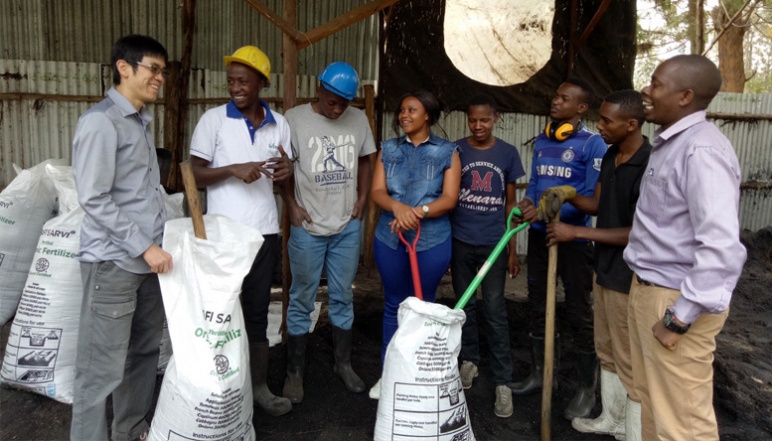Kevin Kung: MIT Alumni Tackling Food and Water Challenges After Graduation
PhD ’17 | Founder and Chief Technology Officer of Takachar

The torrefaction device developed by Kung and his team, which is modular and scalable, enables farmers to produce key components of their fertilizers locally and also reduce the environmental impact of their existing farming practices. Credit: Kevin Kung

Kevin hopes that by keeping fertilizer production de-centralized, there will be a higher demand for local laborers, craftsman, and traders that can also support local rural economies, and also help move their existing practices toward more environmentally sustainable options. Credit: Kevin Kung
Before graduating from MIT in 2017 with a PhD from the Department of Biological Engineering, Kevin Kung worked with professors Alex Slocum and Ahmed Ghoniem, both from the Department of Mechanical Engineering, to develop a small-scale device that could use local post-harvest biomass material to make a substrate for fertilizer. Together, they developed a reactor device that uses a chemical process called oxygen-lean torrefaction, which subjects agricultural biomass to a steady, elevated temperature. The process dries out plant materials in such a way that the residue can serve as a lightweight and nutrient-dense product that can be processed and blended with other nutrients to create a complete fertilizer. Their innovative approach to fertilizer production earned them substantial support from diverse MIT funding sources. Their work was not only supported through a J-WAFS Solutions grant, but also received funding from the J-WAFS Grant for Water and Food Projects in India program, the MIT Tata Center, and the MIT Legatum Center, and was one of three winners of the 2017 MIT Water Innovation Prize.
The idea for a small scale torrefaction device was borne out of the fact that, currently, many smallholder farmers around the world rely on commercial fertilizers to improve crop yields. These fertilizers, largely produced in the northern hemisphere, are often imported and expensive. The torrefaction device developed by Kung and his team, which is modular and scalable, enables farmers to produce key components of their fertilizers locally and also reduce the environmental impact of their existing farming practices. “We noticed that, in many cases, smallholder farmers would burn crops and plant residues in their fields,” Kevin explained, practices which release CO2 and other pollutants into the atmosphere. “These materials, if processed, have the potential to be turned into useful fertilizers, chemicals, and fuels.”
While there are other ways to convert biomass to nutrient-rich soil additives like compost, crop residues are often very loose, wet, and bulky, and are expensive and time consuming to transport or process on-site. Small-scale, low cost, and portable torrefaction can enable farmers to process crop residue on-site with less CO2 impact. The fertilizer blend can then be applied to the field locally, without any significant transportation.
Kevin has continued to develop the torrefaction system that he worked on during his PhD and postdoc appointment at MIT. “When I came to MIT, I was a bioengineer, so I was originally more interested in applied physics as it pertained to biology,” Kevin said. But once at MIT, he found food and agriculture technology to be a meaningful way to apply his technical capabilities as well as his interests in the biological sciences—so much so that he co-founded Takachar, a start-up company that is now commercializing the original torrefaction device, with his business partner Vidyut Mohan. In 2018, Kevin was awarded a prestigious Activate Fellowship for Takachar to help turn his technology into a commercially viable product that can have global impact. Activate fellows receive funding as well as access to facilities, equipment, and expertise from institutes such as the Lawrence Berkeley National Laboratory and UC Berkeley.
Since co-founding Takachar, Kevin, now the CTO, has followed the customer discovery philosophy that his research team first learned from the coaching they received as J-WAFS Solutions grantees, including the value of investing time in interviewing farmers about the applications of Takachar’s torrefaction device. “I think that, ultimately, a project like ours has to be relatable to the people that we are trying to serve,” Kevin tells me, “I learned a lot from my time at MIT and through the research that I have done on campus, but I have also learned equally from the farmers and the fertilizer communities that I work with.” Kevin’s conversations with farmers have expanded his impact vision for Takachar’s torrefaction device. He hopes that by keeping fertilizer production de-centralized, there will be a higher demand for local laborers, craftsman, and traders that can also support local rural economies, and also help move their existing practices toward more environmentally sustainable options. “It’s important and rewarding to look at a whole ecosystem and say, ‘Yes, let’s start with the farmers and if successful there, we can go on to have a much wider impact.’”
Want to find out more about MIT alumni working in food and water? Click here.